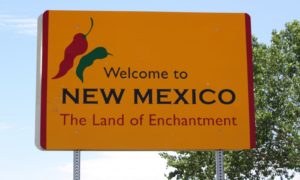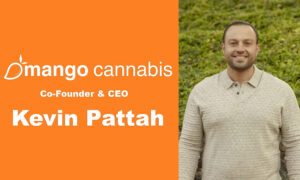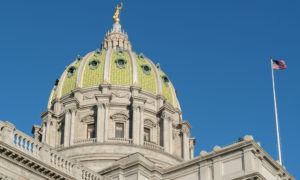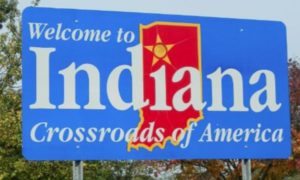The Nevada Tax Commission has approved temporary regulations that could allow businesses to start selling recreational marijuana as soon as July 1.
The regulations lay out rules for issuing and revoking licenses to companies that are already up and running in the medical marijuana industry. While voters approved a ballot measure last year requiring the state to get sales going by Jan. 1, 2018, the so-called “early start” program would allow businesses to launch six months early.
All but one commissioner voted to adopt the regulations as-is, in spite of some calls for amendments.
Proponents say there’s a sense of urgency to start storefront sales because the ballot measure legalizes marijuana possession, but not marijuana purchase. Riana Durrett of the Nevada Dispensary Association, citing law enforcement, said that discrepancy is only boosting the black market.
State officials are also counting on tax revenue from early marijuana sales to help them balance the budget. Gov. Brian Sandoval’s budget proposal calls an additional tax on recreational marijuana sales that would yield an estimated $70 million to support public education.
Critics at the meeting raised concerns that the regulations didn’t sufficiently give liquor distributors first dibs on marijuana distribution licenses, that the state was rushing forward without considering issues such as regulating advertisements and that the agenda for the adoption meeting was inappropriately vague.
_____
Six months after Nevada voters said they wanted to legalize recreational marijuana, adults still aren’t allowed to buy the product at a storefront without a medical marijuana card.
That could change quickly if the Nevada Tax Commission votes Monday to adopt temporary regulations that allow for licensing recreational marijuana businesses. If all goes as planned, sales could start on July 1 — six months earlier than the original ballot measure required.
Proponents say the so-called “early start” program — which was a boon when Oregon implemented it — will help help medical marijuana recoup big front-end capital investments and allow the state to start collecting tax revenue as soon as possible. Revenue from the nascent industry is a significant part of Gov. Brian Sandoval’s proposed budget, which calls for $70 million of it to support education.
The nine-member Nevada Tax Commission is meeting at 9 a.m. on Monday at the Gaming Control Board offices in Carson City and Las Vegas to consider adopting the regulations, which have been in the works for months. They establish procedures for issuing, suspending and revoking temporary licenses for marijuana businesses, require monthly filing of returns and remittance of taxes on marijuana sales, and establish record-keeping rules.
Here are some things to know about them:
What do the regulations say?
Only medical marijuana establishments that are already up and running can apply to be part of the recreational industry during the early start period; about 190 businesses meet that criteria. The establishments must be in good standing, meaning they’re current on all fees and haven’t been cited for illegal activity.
Those applicants must pay a one-time, nonrefundable application fee of $5,000 plus a license fee of $20,000 for a retail store, $30,000 for a cultivation facility, $10,000 for a production and manufacturing facility, $15,000 for a testing facility and $15,000 for a marijuana distributor.
Department of Taxation chief Deonne Contine said she hasn’t received any complaints about the fees, which were prescribed in Question 2, the original ballot measure.
The department won’t disclose the names or identifying information of applicants for marijuana licenses, but will post online the names of entities that ultimately receive a license.
The department also won’t issue a license until it receives written confirmation from a municipality that the business is complying with the municipality’s zoning and location requirements.
While the original regulations only allowed a single application period, which is expected to begin in mid-May and end at the end of this month, the new version allows the department to call for a second application period later in the year that lasts not more than five days. Some businesses have lamented that they can’t get their applications in in time for the first period and wouldn’t be allowed to reapply until next year.
The ballot measure specifies that for the first 18 months the department accepts license applications, it must only accept them from registered medical marijuana businesses.
Grounds for suspension and revocation
Under the regulations, a marijuana establishment’s temporary license could be suspended or revoked if they provide the product to someone younger than 21, if a board member or employee is convicted of certain felonies, or if a municipality terminates the establishment’s authorization to operate or if the business fails to pay a tax or fee.
The department can impose a civil penalty of $35,000 to a marijuana business that operates without a license, and $10,000 for a marijuana business that otherwise breaks the law.
Licenses issued under the temporary regulations are valid until 90 days after Jan. 1, 2018.
A different tax than medical marijuana
The state will collect an excise tax of 15 percent on the “fair market value” of wholesale recreational marijuana. The department is allowed to determine that value as it sees fit based on data from current marijuana cultivators, and can change its methodology as needed under the regulations.
The proposed regulations give details on how to calculate the excise tax, including when to weigh a harvested marijuana plant to determine the tax.
Marijuana sold at retail is also subject to standard sales tax.
Meanwhile, medical marijuana is taxed at a lower level: 2 percent at the cultivation phase, 2 percent at the production phase and 2 percent at the dispensary. By mid-June, establishments must separate the inventory they plan to sell for medical purposes and the inventory they plan to sell for recreational purposes, unless the Legislature enacts a bill to tax medical and recreational marijuana at the same rate.
Liquor distributors feeling snubbed
In the original version of the regulations, the Department of Taxation said it had determined there were an insufficient number of liquor distributors to handle the marijuana distribution, so the distribution would be open to all existing medical marijuana establishments.
That pre-emptive determination drew ire from liquor distributors, who said they typically serve hundreds of businesses each and could handle the workload. They also argued the determination of insufficiency was made with little public input and went against the spirit of the ballot measure, which was promoted as a way to regulate marijuana as alcohol and gave them first dibs on the licenses.
The latest version of the regulations allow the department to open up the distribution task to other marijuana businesses if, after applications are submitted, the department determines the liquor businesses that applied can’t meet state and local requirements in time for the early start program’s launch.
A group named the Independent Alcohol Distributors of Nevada is proposing amendments to the draft regulations that would require distributors to be completely independent and not affiliated with any marijuana establishments at other points in the supply chain. It would also ease the application process for liquor distributors trying to enter the marijuana market.
What’s the reaction?
Four parties responded to an official questionnaire by saying the regulations would have a negative effect on their business. That’s because they wouldn’t be operational by May 31, 2017, and thus wouldn’t be able to get involved in the early start program.
Four other submissions said the regulations would have a beneficial effect. Those comments emphasized that having sales up and running this summer will deter purchases on the black market and that they would allow customers access to safe and lab-tested marijuana from reputable companies.
Others said the regulations will promote tourism in Nevada, and that they make it easy for existing medical marijuana establishments to get into the more lucrative recreational market.
What’s next?
If the regulations are adopted, they take effect 35 days after the vote and are filed with the Secretary of State at that time. During that 35-day window before the regulations take effect, any lawmaker can ask for a review by the Legislative Commission — a group of 12 lawmakers who meet between sessions.
If the Commission determines that the regulations exceed statutory authority, they inform the Department of Taxation, which has 60 days to provide revised regulations. The process can happen again, adding another 30 days to the timelines.
Apart from the temporary regulations, the department is working to finalize permanent regulations by Dec. 31.
Link – The Nevada Independent. Article by Michelle Rindels




































